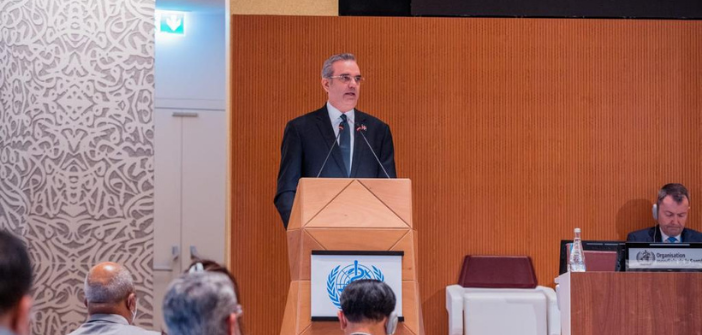President Luis Abinader presented the best practices adopted by his government in managing COVID-19 at the 75th World Health Assembly, held in Switzerland. With the aim of opening the Dominican Republic to the world, the country recorded one of the lowest fatality rates globally. “The results,” he emphasized, “are not the result of chance or destiny but of a rigorous, planned policy, adapted to each moment and to the healthcare professionals” whom he will eternally thank for their work.
The Dominican leader addressed the assembly with respect towards the WHO Director-General, Tedros Adhanom Ghebreyesus, for his leadership and that of his team during these challenging times, as well as towards the heads of state of the organization’s member countries and ministers. “During this pandemic, so far, we have recorded 581,044 infections, with 576,006 recoveries and 4,377 deaths,” he stated. He indicated that, to date, they have administered over 15 million vaccines nationwide, ensuring a two-dose vaccination schedule to nearly 6 million people from an initial target population of 7.8 million. Additionally, four vaccine doses per person are guaranteed for the entire population. He attributed these results to the responsible behavior of citizens who civically presented themselves to receive their doses following the established vaccination plan, a door-to-door vaccination strategy, and the massive deployment of vaccination sites, one for every 5,000 people. Mr. Abinader stated that the application of the third dose, for which the country was a pioneer, increased the antibody levels fortyfold in the population that received it. According to him, this measure dampened the impact of the Delta variant from July to September 2021, thereby reducing infections, hospitalizations, and deaths compared to previous outbreaks caused by the Ancestral, Beta, and Gamma variants.
The head of state recalled that the process was accompanied by a rigorous clinical study, published in a prestigious article in the journal Nature last January, which was awarded by the International Vaccine Society for the number of times it served as a reference for studies in other countries. Another measure was to strengthen the national laboratory, guaranteeing access to PCR tests for everyone in need, with results provided in less than 48 hours. The Dominican Republic is also one of the first countries in Latin America to implement COVID vaccination in children. “We have learned that agility in decision-making was decisive in winning some of the battles in this health war,” he stated. He insisted that the Dominican Republic made a decisive move to intervene in vaccination, administering innovative drugs and rapid hospitalization, based on local knowledge of its doctors and previous research. “We expanded the vaccination schedule by administering the third dose. This is a monumental decision that undoubtedly played a fundamental role in maintaining the overall fatality rate at 0.75, one of the lowest in the world,” he said.
A recovery at a high pace President Abinader said that good management of the health emergency allowed the economy to recover at a very high pace. He exemplified that the World Tourism Organization recently recognized the Dominican Republic as the first country in the world to have successfully fully restored tourism after the pandemic. It was also declared a category 1 country at risk for COVID-19 by the American CDC. Health amid war “While the COVID-19 pandemic persists and a horrific act of war disrupts global peace, we welcome this assembly held within the framework that the Secretary-General named ‘Health for Peace and Peace for Health.’” He urged to continue efforts to multiply endeavors towards universal solutions. To ensure a lasting and viable peace, he said, it is necessary to guarantee universal access to health, particularly ensuring equitable access, especially for the most disadvantaged countries, to vaccines and health technologies, by creating a fund to address future crises. He believed that after two years of a pandemic that tested humanity and all institutions, this meeting constitutes a historic opportunity to strengthen the universal framework of health security.


